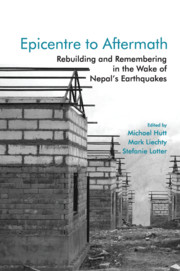15 - Bhukampa: Nepali Recitations of an Earthquake Aftermath
Published online by Cambridge University Press: 08 July 2021
Summary
Poetry comes nearer to vital truth than history.
—Ralph Waldo EmersonIntroduction
This is a discussion of the local literary response to the 7.8 magnitude earthquake that struck the central hills of Nepal on Saturday, 25 April 2015 and the series of lesser earthquakes and aftershocks that followed—an aspect of this disaster that remains almost totally unstudied.
After a disaster strikes, it is inevitable that disaster themes will dominate not only the news media content but also the literary production of the affected society for a period of time. As a contemporary reviewer of the great Lisbon earthquake of 1755 remarked:
Earthquakes are great plagues, as illuminated by the great quantity of bad writing that they produce in all parts from the ground and over which in recent years many a press has sighed. (Wilke 2017)
Of course, there will be major differences between the aftermaths of two disasters that were geographically and temporally so far apart. For instance, while Nepal's domestic news media were dominated by the earthquakes and their aftermath for many weeks, and the disaster was also reported on extensively in international news media, word of the Lisbon disaster took weeks even to reach other European capitals (Wilke 2017). But in certain other respects there are striking similarities. In Nepal, as in Portugal, a huge number of narrative accounts, opinion pieces, and more literary reflections on the earthquakes and their impact appeared during the early months of the aftermath. These texts, produced mostly in Nepali, but also in English and in other languages of Nepal, circulated nationally in print and globally online, via social media, and on platforms such as YouTube.
The local literature of a disaster aftermath not only sheds light on individual and personal responses to the disaster but also provides insights into the public mood of the aftermath and the terms of its political, cultural, and social discourse—the ‘endogenous response’, that is, which Albala-Bertrand (1993:23) argues has been overlooked or disregarded in most writings on disaster response. The content and tone of this literature raises a number of interesting questions. For instance: What is the relationship between a post-disaster literary outpouring and the broader ‘endogenous response’ to a disaster?
- Type
- Chapter
- Information
- Epicentre to AftermathRebuilding and Remembering in the Wake of Nepal's Earthquakes, pp. 367 - 402Publisher: Cambridge University PressPrint publication year: 2021



